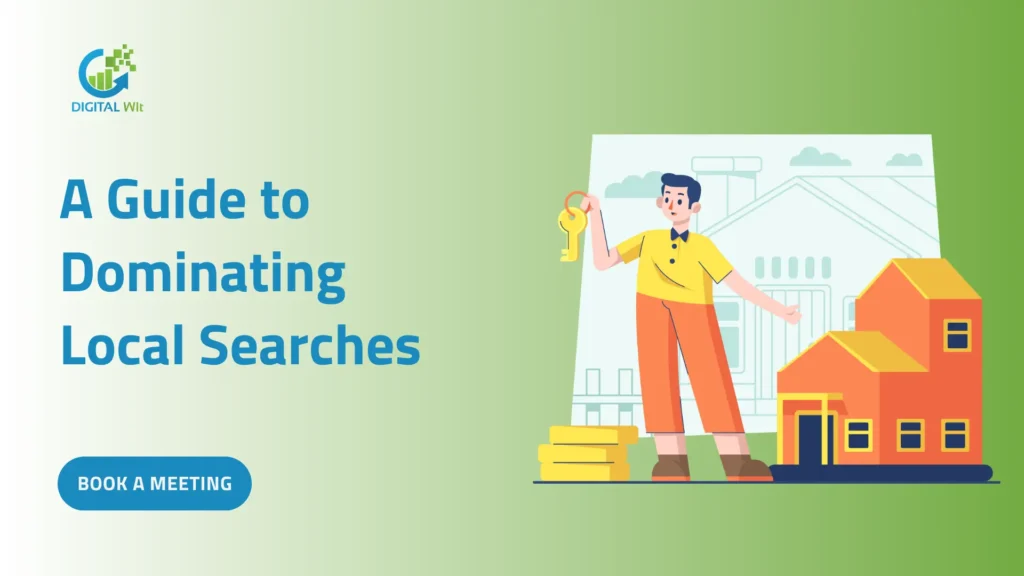
A potential homebuyer is sitting in their living room, scrolling through Google for “best real estate agents near me.” Your competitors show up, but you don’t. Why? Because you’re not leveraging the power of Local SEO for Real Estate Agents.
In today’s digital age, local SEO isn’t just an option; it’s a must for real estate agents who want to dominate their local markets.
Let’s dive into how you can use Geo-targeted SEO strategies for real estate to get found, attract clients, and grow your business.
How Local SEO Can Help Real Estate Agents
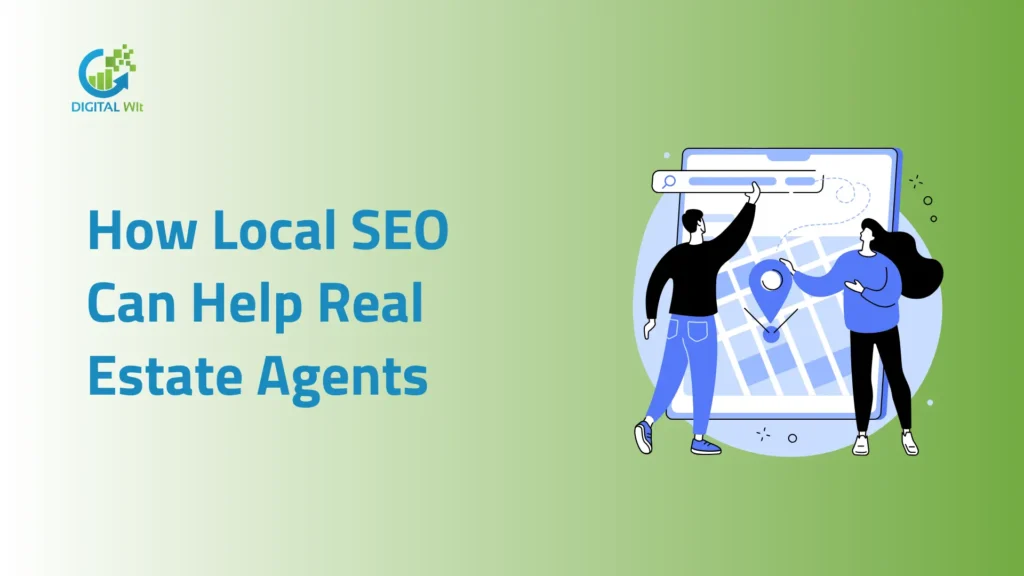
Local SEO can be a game-changer for real estate agents. Did you know that 46% of all Google searches are for local information? That’s millions of people looking for nearby businesses, including homes and real estate services, every day.
Geo-targeted SEO ensures that your listings, website, and Google Business Profile are optimized so potential buyers in your area can find you quickly.
Imagine every local search result pointing to your services – it’s like being the most popular neighbor on the block!
Organic and paid search drive 57% of visitors to real estate websites, emphasizing the critical role of SEO in improving online visibility. Source: Ranktracker
Ready to rank locally and help your clients find their dream homes? It’s as easy as planting your digital “For Sale” sign where everyone will see it! 🏡🔍
What is Local SEO and Why Does It Matter?
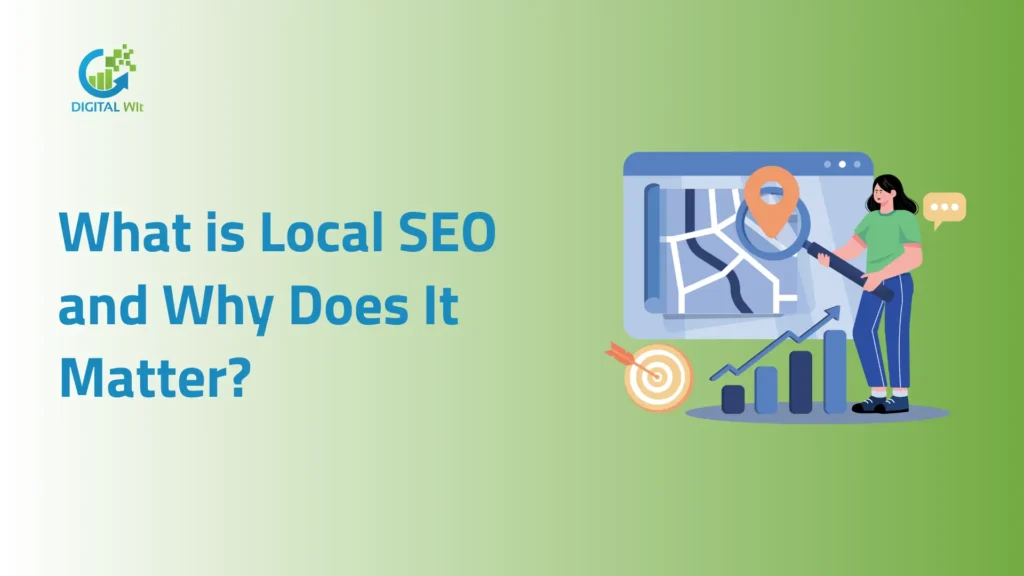
Local SEO, or local search optimization, helps businesses like real estate agencies appear in local search results.
Think of it as making your business the “talk of the town” online. When people search for “real estate agents in [your city]” or “homes for sale near me,” local SEO ensures your business shows up where it matters most.
For real estate, this is crucial. Imagine someone searching for “luxury homes for sale in Beverly Hills.”
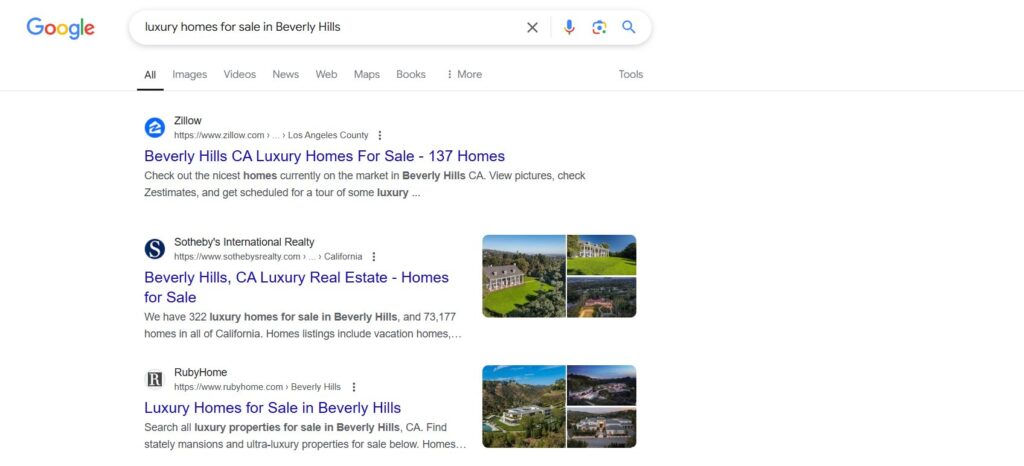
If your name doesn’t appear, you’re missing out on high-value clients actively looking for your services. This is where Google Geo-targeted SEO for Real Estate Agents becomes a game-changer.
Location-Based SEO also matters because it focuses on intent-driven searches. People searching locally are closer to making a decision, whether it’s buying a property, selling one, or connecting with an expert.
Being visible in these moments means being part of their solution.
Benefits of Local SEO for Real Estate Agents
- Increased Visibility: Local SEO puts your agency on the map—literally. Your business gets displayed in local pack results, map searches, and organic results, giving you a leg up over competitors.
- More Leads, Better Clients: Google My Business for real estate agents attracts serious buyers and sellers who are ready to take action.
- Cost-Effective Marketing: Compared to paid ads, local SEO generates ongoing organic traffic without constant investment.
- Trust Building: Positive client reviews and a strong online presence establish your credibility, making you the go-to expert in your area.
Steps to Build a Strong Local SEO Plan
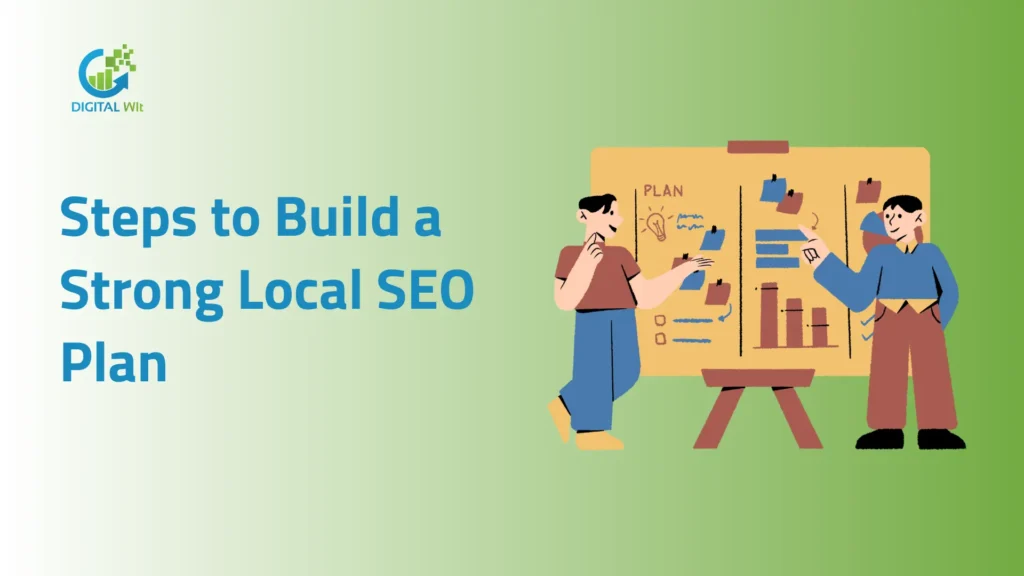
Why did the real estate agent bring a ladder to the open house? Because they wanted to elevate their local SEO game!”
This joke highlights the importance of standing out in your local area. Just like a ladder gets you to new heights, a solid Geo-targeted SEO plan can take your real estate business to the top of search results.
With competition fierce in the industry, especially in high-demand markets, being visible in local searches can make the difference between closing a deal or missing out. So, let’s climb that SEO ladder strategically!
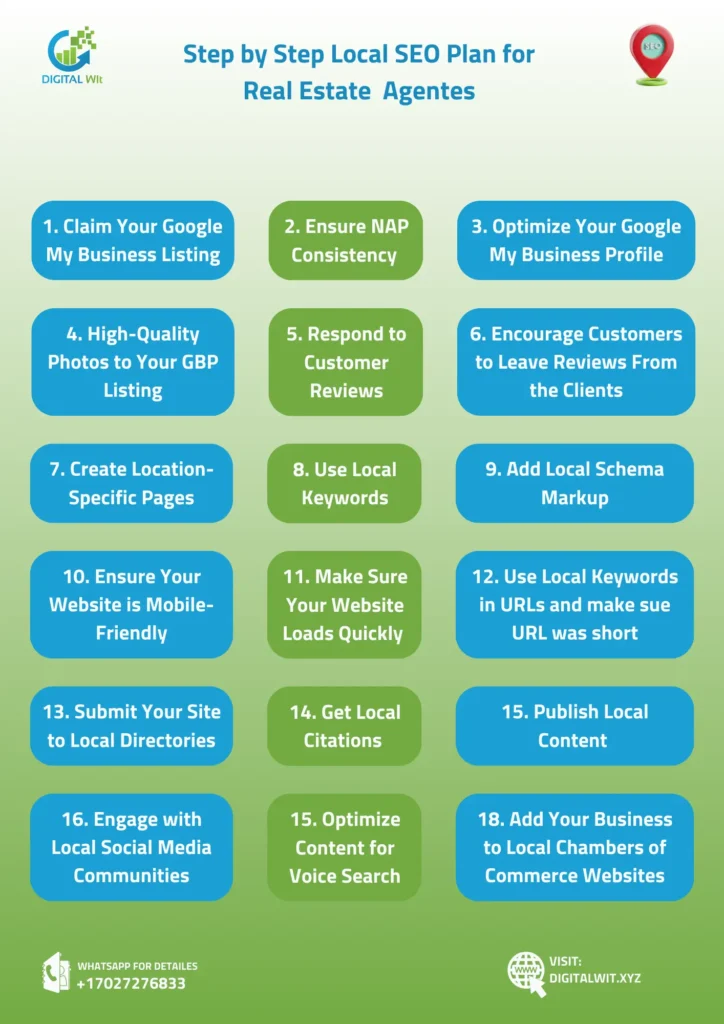
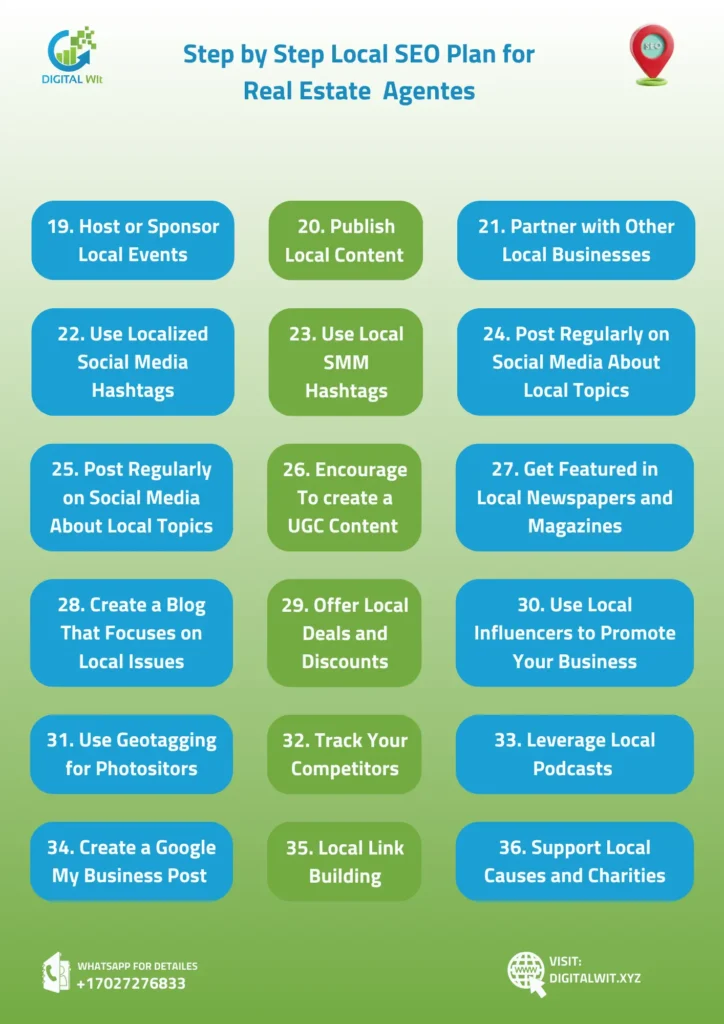
Finding the Right Local Keywords for Real Estate Realtors
Start by identifying what potential clients are searching for. Keywords like “luxury real estate local SEO companies”, “real estate agents near london”, and “Google Local SEO for Real Estate Agents” should be your starting point. Tools like Ahrefs, SEMrush, and Google Keyword Planner can reveal high-volume local keywords.
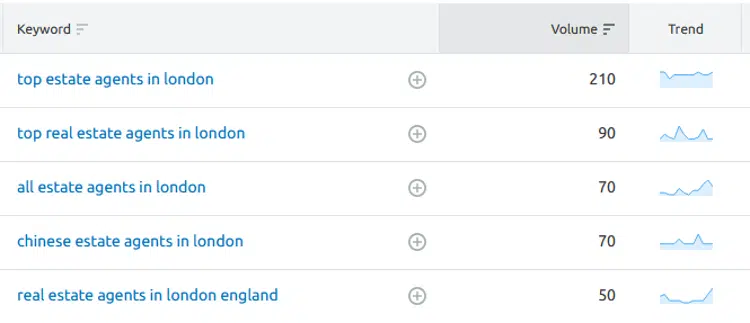
- Focus on long-tail keywords that target specific queries, such as:
- “Affordable real estate agents in Brooklyn.”
- “Homes for sale near top schools in Austin.”
- Research competitor keywords using tools like BrightLocal to uncover gaps in your strategy.
Making Your Website Ready for Local Searches
Your website needs to be optimized for both users and search engines. Here’s how to make it shine:
- Local Keywords in Key Places: Add location-specific terms in titles, meta descriptions, headers, and body text.
- Service Pages for Specific Areas: Create dedicated pages for cities, neighborhoods, or zip codes you serve. For example, “Luxury Homes in Malibu” or “Real Estate Agents in Chicago Suburbs.”
- Mobile Optimization: With most property searches happening on mobile devices, ensure your site is responsive and loads quickly.
Using Google Business Profile to Stand Out for Estate Realtors
Your Google Business Profile (GBP) is your most powerful tool for local SEO. Here’s how to use it effectively:
- Complete Your Profile: Include business name, address, phone number, hours, and website URL.
- Add Photos and Videos: Showcase properties, your team, and happy clients.
- Post Regular Updates: Share new listings, client success stories, and community events.
- Optimize Categories: Choose relevant categories like “Real Estate Agency” or “Luxury Homes Realtor.”
87% of consumers rely on Google to evaluate local businesses, and 77% use Google Maps for local searches. Having a strong Google My Business profile significantly boosts local search visibility. Source: Linkifi
Building High-Quality Local Citations and Backlinks
Local citations are mentions of your business name, address, and phone number (NAP) on other websites. Ensure these details are consistent across platforms like Yelp, Moz Local, and Bing Places for Business.
For backlinks:
- Collaborate with local businesses, community blogs, or influencers.
- Sponsor local events or charities and request backlinks in return.
Getting Great Reviews on Google Business Profile from Happy Clients
Reviews are the lifeblood of local SEO. A steady flow of positive feedback boosts your rankings and credibility. Encourage clients to leave reviews by:
- Sending personalized follow-up emails after closing deals.
- Providing a direct link to your GBP review page.
- Responding to all reviews—good or bad—to show engagement.
Special Tips for Luxury Real Estate Local SEO
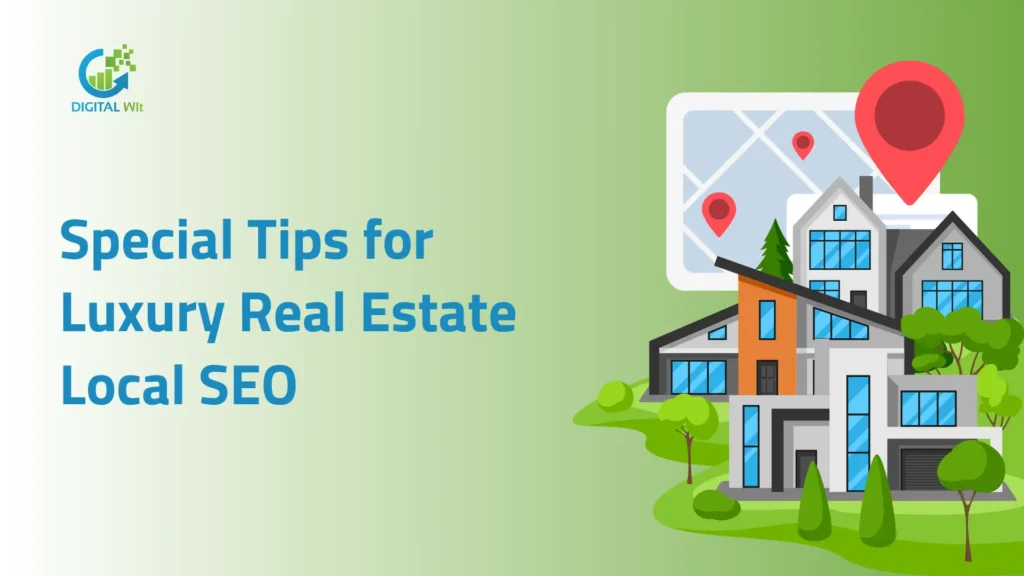
In 2025, most online traffic (about 51%) comes from organic searches, making a strong local SEO strategy essential to reach wealthy buyers effectively. Here’s how luxury real estate businesses can stand out locally:
Attracting High-Value Clients with Smart Keywords
Luxury clients search for specifics like “luxury homes with ocean views in Miami” or “top real estate agents in Beverly Hills.” Tailor your keywords to address their needs and preferences.
Include terms like:
- “Exclusive real estate listings in LONDON.”
- “Homes for sale near private schools in New York.”
Showing Off Luxury Homes with Amazing Photos
First impressions matter, especially in luxury real estate. Use professional photography and videography to highlight:
- Key features like infinity pools, high-end kitchens, or panoramic views.
- Virtual tours for clients who prefer browsing from home.
Optimize images with descriptive filenames and alt tags like “luxury-home-Malibu-ocean-view.jpg” to boost search visibility.
Building Trust with Client Stories and Testimonials
Share detailed testimonials from high-profile clients. Include specifics, such as how you helped them close deals quickly or find their dream homes.
Video testimonials add an extra layer of authenticity.
Mistakes to Avoid in Geo-targeted SEO
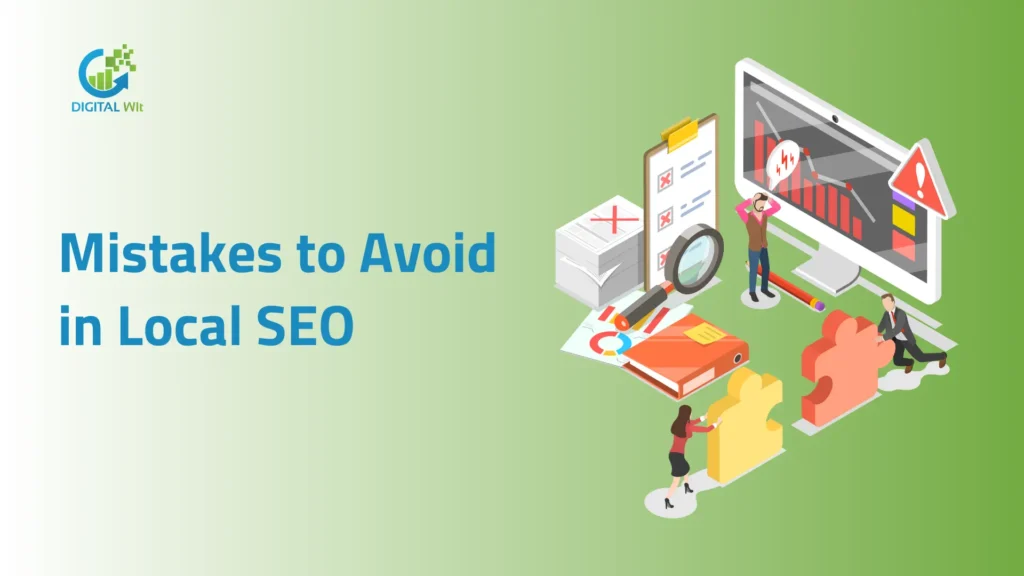
Not Making Your Website Easy to Use on Phones
Did you know most homebuyers use their phones to search for properties? A clunky mobile experience can cost you leads. Test your website’s mobile responsiveness and fix navigation issues.
Forgetting to Update Your Business Information
Inconsistent or outdated information confuses potential clients and hurts your Location-Based SEO rankings. Regularly update your Google Business Profile, website, and directories.
Skipping Local Content on Your Website
A blog with local content helps you rank higher and engage visitors. Write about:
- “The best neighborhoods to buy a home in New york.”
- “Real estate market trends in London.”
Tracking Your Local SEO Results
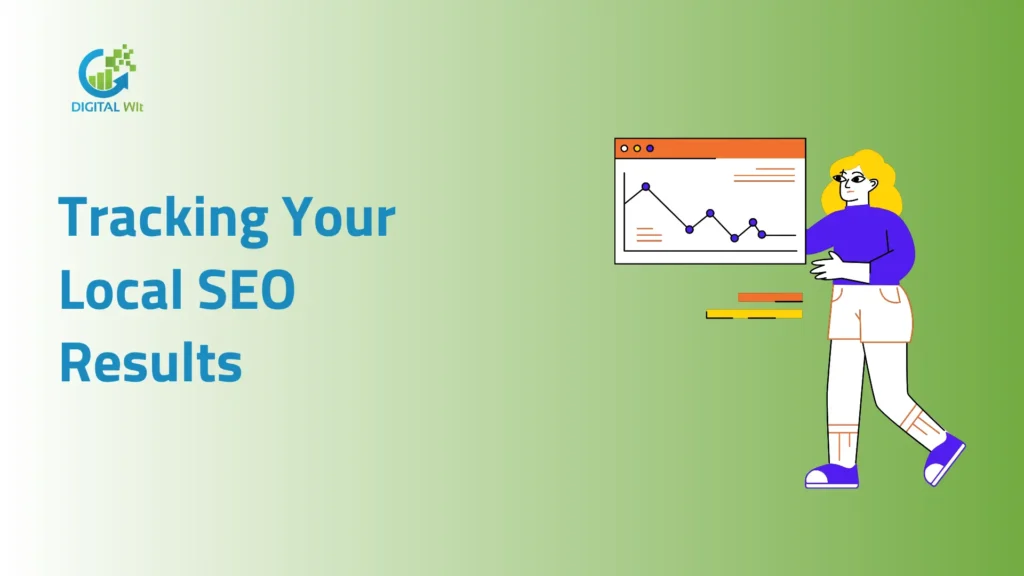
Once you’ve implemented a solid local SEO strategy, tracking your progress is crucial. By monitoring the right metrics, you can understand what’s working, what needs improvement, and how to fine-tune your efforts. Without proper tracking, you’re essentially flying blind.
Key Metrics to Measure Success
Here are some key metrics to focus on when evaluating your Location-Based SEO performance:
- Local Search Impressions
- This metric shows how often your business appears in local search results. High impressions mean your business is visible, but if they’re not translating into clicks, further optimization might be necessary.
- Click-Through Rate (CTR)
- CTR measures the percentage of users who click on your link after seeing it in search results. A low CTR could indicate that your title tags, meta descriptions, or call-to-action need improvement.
- Conversion Rate
- This tells you how many users take action after visiting your site, such as filling out a form, calling your office, or booking an appointment. It’s one of the most critical metrics for understanding how well your website is performing.
- Google Business Profile Insights
- Google provides specific metrics like profile views, clicks on your contact details, and directions requests. These insights offer a clear picture of how users are interacting with your business listing.
- Local Keyword Rankings
- Tracking the performance of targeted local keywords like “real estate agents in Southampton” helps measure how your SEO efforts are impacting search rankings.
- Bounce Rate
- A high bounce rate might indicate that visitors aren’t finding what they’re looking for on your site. This metric is crucial for understanding user engagement and site relevance.
Tools to Help You Track and Improve
Using the right tools can streamline your tracking process and give you actionable insights to refine your strategy. Here’s how you can use BrightLocal, Whitespark, SEMrush, and Local Dominator effectively:
- Google Analytics
- Purpose: Tracks overall website traffic, user behavior, and conversion paths.
- How to Use: Set up goals to monitor key actions like form submissions or contact clicks. Use demographic data to better understand your audience.
- Google Search Console
- Purpose: Monitors your site’s performance in Google’s search results.
- How to Use: Check for keyword rankings, click-through rates, and search impressions. Fix indexing or crawl errors to ensure optimal visibility.
- BrightLocal
- Purpose: A comprehensive tool for local SEO tracking and analysis.
- How to Use:
- Monitor your local rankings for targeted keywords.
- Track reviews and manage your online reputation.
- Analyze Google Business Profile performance and generate detailed reports.
- Compare your business with competitors in your area.
- Whitespark
- Purpose: Focuses on local citation building and tracking.
- How to Use:
- Identify new local citation opportunities to improve visibility.
- Audit existing citations for consistency in NAP (Name, Address, Phone) details.
- Use the Reputation Builder feature to collect and manage client reviews.
- SEMrush
- Purpose: A versatile SEO tool with strong local SEO features.
- How to Use:
- Track keyword rankings on a local level.
- Analyze competitor strategies, including backlinks and content.
- Use the Site Audit feature to identify and fix technical SEO issues that impact local rankings.
- Local Dominator
- Purpose: Specializes in helping businesses dominate their local markets.
- How to Use:
- Generate detailed reports on local search performance.
- Identify gaps in your local SEO strategy compared to competitors.
- Optimize Google Business Profile and improve rankings in map packs.
Take the Next Step to Grow Your Real Estate Business

Create a Simple Local SEO Plan Today
Starting with a plan might sound overwhelming, but it doesn’t have to be. The key to success in Geo-targeted SEO for Estate Agents is to begin small and grow steadily. Break it into manageable steps:
- Set Clear Goals: What do you want to achieve? More visibility? Increased leads? Better engagement? Having clear objectives helps you prioritize your efforts.
- Keyword Research: Identify the terms people in your target area are searching for. Tools like Google Keyword Planner and BrightLocal can help. Look for long-tail keywords like “real estate agents near Manchester” or “luxury homes for sale Bradford” to target specific audiences.
- Focus on Key Areas First: Instead of tackling everything at once, concentrate on high-impact areas like optimizing your Google Business Profile (GBP) or creating localized blog content. For example, start by publishing a blog on “Top 5 Neighborhoods to Buy Homes in Bradford.”
- Track and Adjust: Regularly monitor your progress using tools like Google Analytics. If one strategy isn’t delivering results, pivot and try another approach.
Remember, Location-Based SEO is a marathon, not a sprint. Taking consistent, small steps will lead to long-term growth.
Boost Your Real Estate Business with Local SEO!
Want to be the best estate agent in your area? Local Search Engine Optimization is the key!
By optimizing your property listing, using SEO best practices, and ensuring visibility on Google Maps, you can rank higher in local search rankings and attract more clients.
Real estate companies can drive traffic with website content tailored to search engines like Google, and encouraging clients to leave positive reviews builds trust.
Follow effective local SEO tips to create a strong local brand and dominate the competition. Start using local SEO for estate agents to boost visibility and secure leads !
Keep Up with Changes in SEO Trends
The world of SEO is like the real estate market—it never stands still. What worked last year might not be as effective now, so staying updated is crucial. Here’s how you can stay ahead of the curve:
- Voice Search Optimization: With the rise of voice-activated devices like Alexa and Google Assistant, more people are using conversational queries. Phrases like “Where can I find real estate agents near me?” are becoming more common. Adjust your content to include these natural language questions.
- Focus on Localized Content: Search engines now prioritize hyper-localized results. Writing about local topics like school districts, neighborhood amenities, or recent real estate trends can help you rank higher.
- Mobile-First Indexing: Google emphasizes mobile-friendly websites. Ensure your site not only loads quickly but also looks great on smaller screens. A responsive design isn’t just an option—it’s essential.
- Emerging Platforms: Platforms like Nextdoor are gaining traction for hyper-localized searches. Real estate agents can use such platforms to connect with their community and advertise their services.
- Leverage AI and Analytics Tools: Tools like Ahrefs, SEMrush, and BrightLocal are incorporating AI to provide deeper insights into keyword trends and competitor strategies. Learn how to utilize these tools to refine your Location-Based SEO approach.
By keeping up with trends and adopting a flexible approach, you can stay ahead of your competition and maintain consistent growth. Organic search yields higher conversion rates (3.2%) than paid search (1.5%). SEO offers a remarkable return on investment (ROI) of 1,389%, compared to 36% for PPC. Source: Ranktracker
Work with Experts to Get Better Results Faster
Local SEO can get complicated, especially when juggling tasks like keyword research, content creation, citation building, and review management. Sometimes, bringing in a team of experts like Digital Wit can make all the difference.
Here’s why partnering with professionals is a smart move:
- Tailored Strategies: Experts understand the unique challenges of the real estate industry and can create a customized plan for your business.
- Time-Saving: Instead of spending countless hours figuring out SEO, you can focus on what you do best—helping clients buy and sell properties.
- Proven Expertise: Agencies like Digital Wit have years of experience and use proven methods to deliver results. From crafting keyword-rich content to managing backlinks, they know what works.
- Advanced Tools and Techniques: SEO agencies use industry-leading tools to analyze your competition, track your progress, and identify opportunities for growth.
- Stay Ahead of the Curve: Professionals keep up with the latest SEO trends and algorithm changes, ensuring your business stays visible and competitive.
By investing in experts, you’re not just hiring help—you’re making an investment in your business’s long-term growth.
Whether you need guidance on optimizing your GBP, refining your content strategy, or creating backlinks, an expert team can provide the support you need to achieve your goals.
While 70% of real estate agents don’t have websites or sufficient SEO strategies, adopting best practices gives you a significant competitive advantage in local search rankings. Source: Marketing Scoop
FAQs About Professional Local SEO for Real Estate Agents

What is Local SEO for real estate agents?
Local SEO is the process of optimizing your online presence so that your real estate business appears in local search results, helping you connect with nearby clients searching for real estate services.
Why is Local SEO important for realtors?
Local SEO helps realtors attract more qualified leads, build trust with local clients, and increase visibility in searches like “real estate agents near me” or “homes for sale in London.”
How do I optimize my Google Business Profile for real estate?
Update your profile with accurate business details, add high-quality property photos, use relevant keywords, and encourage satisfied clients to leave reviews.
What keywords should I target for Local SEO in real estate?
Focus on keywords like “luxury homes for sale in Vegas,” “real estate agents in Birmingham,” or “homes near Nottingham College.”
Can Local SEO help me attract high-value clients?
Yes! By using keywords tailored for luxury clients, showcasing high-end properties, and building a strong online reputation, you can attract affluent buyers and sellers.
Local SEO for Real Estate Agents is your ticket to standing out in a crowded market. Whether you’re helping first-time buyers or catering to luxury clients, the strategies we’ve discussed can help you attract and retain the right audience. Start implementing these tips today, and watch your business grow.
























